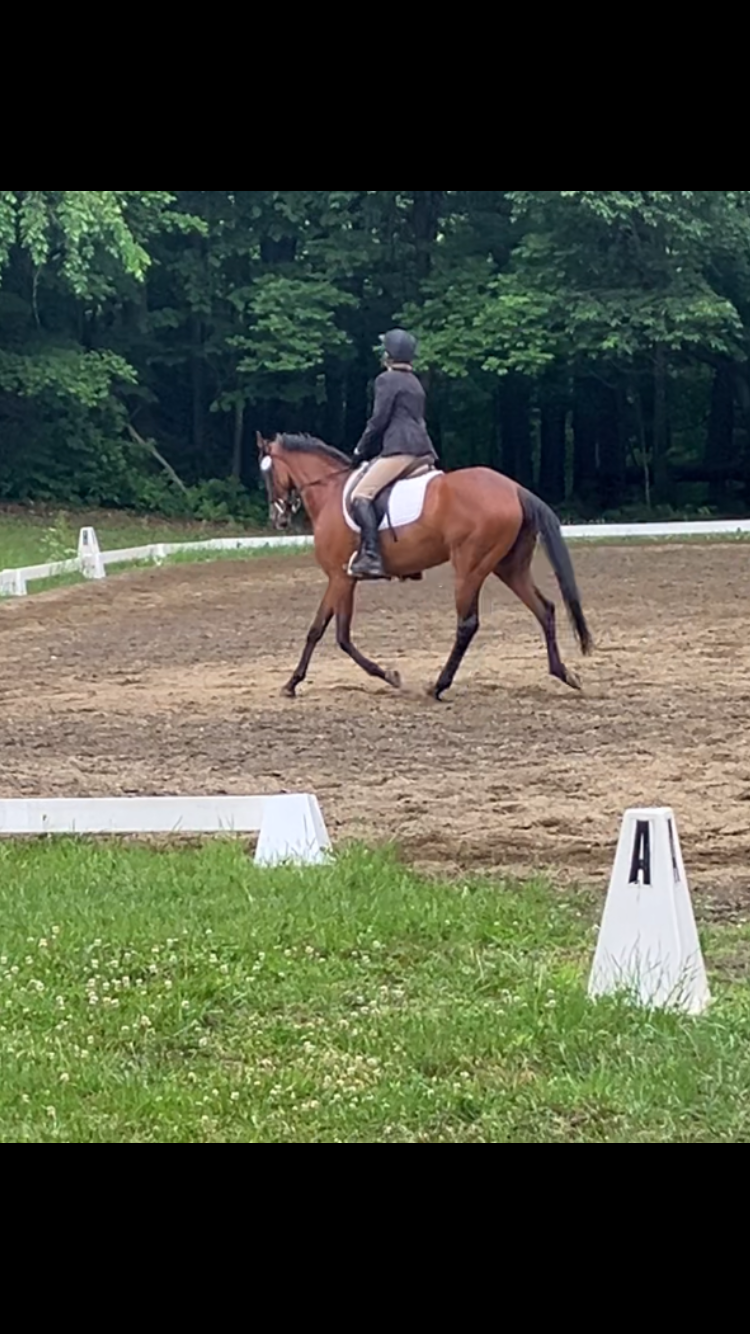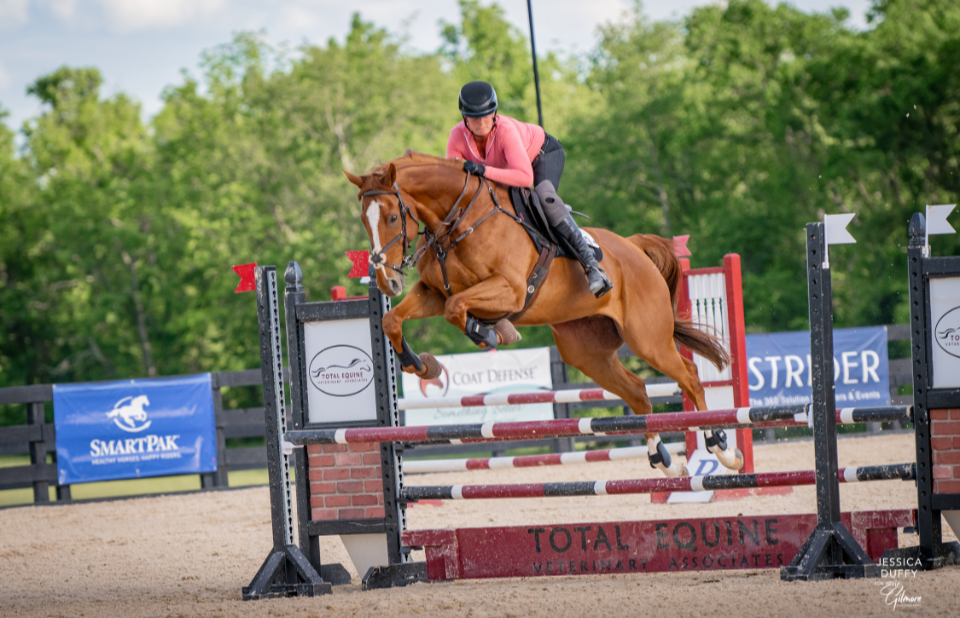This article is brought to you with support from Sentinel Horse Feed.
“A happy horse is a beautiful thing to be around.” – Sharon White
With a barn full of beautiful horses, it’s clear that, as a five-star event rider, Sharon knows a thing or two about keeping her horses happy and healthy. Her feeding regimen is the key to her success, which was crafted with assistance from experts at Sentinel Horse Feed.
“I’m not a feed expert in any way, shape or form, but I am an expert horseman,” Sharon said. “Horses will always tell you what’s going on with their feed if you pay attention to how they eat, if they leave anything, their poo, their coat condition, the shine, the look in their eye, their way of going. It all really matters.”
Creating a feeding regimen based on the horse’s needs naturally results in a program tailored to each specific horse. You won’t find a one-size-fits-all solution in Sharon’s feed room.
“Each horse is an individual,” Sharon said. “I think each breed is very unique and specific. You have to know the breed you’re dealing with. A Warmblood is different from a Thoroughbred, and very different from a pony. An older horse is much different from a younger horse. All of these things really matter.”
If you’re not sure how to tailor your program to your individual horse, Sharon’s answer is simple: ask your horse. “It’s hugely important to pay attention to what your horses are telling you,” she said. “They’re very earnest creatures.”
Sharon asks herself a few questions when it comes to feeding horses:
- Is your horse too hot? Are you feeding the horse too much?
- If your horse is too lazy, are you not feeding them enough?
- How old is your horse, and are they still growing?
- What is your horse’s body condition? Do they need weight, and/or are you working to put muscle on?
On a day-to-day basis, Sharon ensures that her horses have forage available at all times. For those horses that tend to be more like a vacuum than a horse and hoover down all their forage as fast as possible, she uses slow-feed hay nets to keep them from eating too quickly. Alfalfa cubes and dust-free hay are always on-hand as an additional option.
“My horses tend to be in a lot of work, so I make sure they have enough energy from their hard food,” Sharon said. “This is where Sentinel is really useful for me, because I don’t tend to feed a lot of hard food. I use the Sentinel Performance LS, which is an amazing low-starch grain, because they really glow and perform on it without feeding too much. For additional support, the nutritionists at Sentinel organize a top dress for me called Sentinel Care Topline 30, so I know that they’re getting the vitamins and minerals they need.”
While Sharon tries to avoid overfeeding too much grain, when needed. “For my horses that are harder keepers that do need more grain, I break it into many feedings – I’ll feed up to four times a day,” she said. And when needed, Sentinel’s Care Gastric Support feed can come in clutch for additional support of her horses’ digestive systems.
To keep her competition horses who are easy keepers happy while their barn mates are chowing down, her solution is probably already in your fridge: carrots. “I’m a believer in carrots,” Sharon said. “I’m a believer in a handful of carrots to keep them happy when everyone else is eating in the barn. You don’t want to stress a horse out by feeding everybody else but not them, right? And so a carrot can go a long way to keeping them mentally happy.”
A big believer in the ideals of the forage-first philosophy of feeding horses, with grass and hay making up the majority of her horses’ diets, Sharon says her horses’ must have forage available throughout each day.
“To me, grass and hay is hugely important,” Sharon said. “I think that horses need to have forage in front of them all the time.”
If you’ve been lucky enough to attend an event at the Kentucky Horse Park, then you’ve driven through those fields of bluegrass that give the state its nickname. While many might assume that those lush fields are perfect for raising competition horses, Sharon disagrees. She believes that overly rich hay and grass can do your horse a disservice.
“I want dust-free hay, but it doesn’t need to be the most amazingly green, beautiful alfalfa-looking thing I have ever seen, because then you have to really be careful with the amount you feed,” Sharon said. “And I think that horses need to have forage in front of them all the time. They’re meant to graze all day long. So I would prefer that they have that ability. It helps with all sorts of gut issues and everything else. I think alfalfa is rocket fuel! So it has its purpose, for sure. I do feed alfalfa cubes to some of my hard feeders. I soak them very well. I think that is a useful thing to do, if they like it. It also helps buffer the stomach.”
Sharon understands that, like humans, horses also deserve some ‘me time.’ At her barn, her horses know that their time out grazing in their pastures is their own. “My horses tend to be out all night and inside during the day, because that way they know their time alone is when they’re out and no one’s gonna bother them,” Sharon said. “And I think that’s important. During the day, I can monitor how they’re eating and whatnot, and what things affect them.”
Of course, with a full schedule of competitions from spring to late fall, Sharon’s horses don’t always have an exact regular schedule. Like any elite athlete, the horses at Last Frontier Farm need many more calories during competition season than over the winter.
“Their workload matters a lot as to the amount of grain I would feed them,” Sharon said. “In competition season, if my horses have a day off, they get half food. They do not get their full meals, they get half of their meals because they’re not actually burning the energy that they would in work.”
The biggest changes for her horses come in the off season, when even some of their supplements are reduced or stopped altogether. “They’ll get breakfast and dinner, but they won’t get three meals a day,” Sharon said. “We’ll cut way back on the amount. I supplement during the competition season– like my electrolytes. Most of my competition horses would come off of all supplements in the off season, to give everything a break.”
There are many different feeding philosophies floating up and down barn aisles all over the country– low starch versus high calorie, never feed grain versus some horses need grain, feed alfalfa versus stay far away from alfalfa. Navigating the chaos of information surrounding the right way to feed your horse can be confusing, to say the least. Sharon says that for anyone who’s having a hard time figuring out what’s best for their horse, listen to what your horse is telling you.
“Knowledge is power, but information can be deadly, right?” Sharon said. “So, if you are looking at the information and not the horse, you’re doing yourself a disservice. So you have to look at the horse or pony, and pay attention to the animal, the creature or the living thing, not the information that says this is what you must do.”
As for herself, Sharon tries to listen to her own body the same way she would listen to her horses. “I would think of it exactly the same as I do my horses, right? If you actually pay attention to what you eat, your body will tell you, ‘Oh, that works for me,’ or ‘Oh, that does not work for me.’ I happen to love salmon, and I know the things that my body actually loves because I feel better after I eat them.”
While she has to be conscious of her health, particularly when she’s on-the-go at horse shows where healthy options are few and far between, throughout her career Sharon has learned that not eating at all has more negative consequences than eating something she normally wouldn’t consider healthy.
“What I am personally just learning is the fact that not eating has just as many negative effects for me as eating the wrong thing, right?” Sharon said. “I don’t like breakfast, I get busy. I forget to eat. And then by three or four o’clock in the afternoon, wow, I am not doing anything well. And I don’t realize it’s just because my body is like, ‘Okay. And now we’re just in shutdown mode.’”
“I try to be nicer to myself, and then just realize, like you’re either gonna feel good or you’re gonna feel bad, right?” Sharon continued. “If you don’t eat, you’re gonna feel bad. I try not to eat processed foods, but you know what a peanut butter cracker goes a long way. It comes in a package, so it’s processed, but it puts me in a better mood, so it’s going to be okay. That is better than not eating and then becoming just an absolute crazy person.”
At the end of the day, Sharon’s advice is to try your best to eat healthy, listen to your body about what it needs, but don’t overthink it – which, she admits, is easier said than done. “I have to be careful of turning everything I put in my mouth into this big project, because I tend to do that with all things,” she laughed. “I’m going to be aware of everything, I’m going to think about everything, I’m going to try and do the right thing. And sometimes, that is just trying too hard and actually, just eating is all you got to do, right?”
The same concept applies to Sharon’s horses, which are always the priority so that they can perform to the best of their abilities for her. Listening to each horse, calling in professional assistance to craft the right program, and never being afraid to make changes based on current needs helps set Sharon’s program up for success from the ground up – starting with nutrition.
Love this article? Be sure to check out our interview with Sentinel’s Equine Product Manager Kristyn Sturken on The Go Eventing Podcast here, and read more horse & human nutrition tips from another Sentinel-supported rider, Ema Klugman, here. To learn more about Sentinel Horse Feed, visit feedsentinel.com/performance.




























